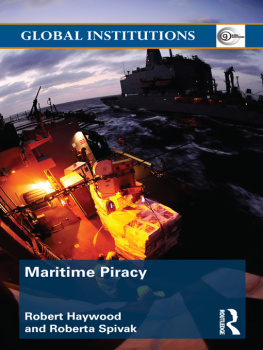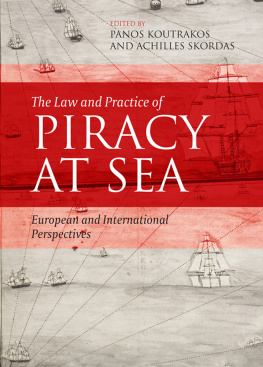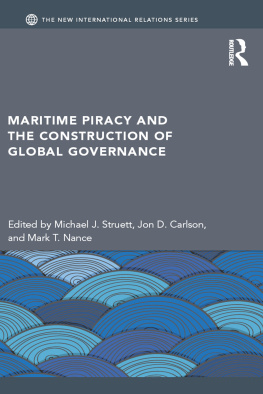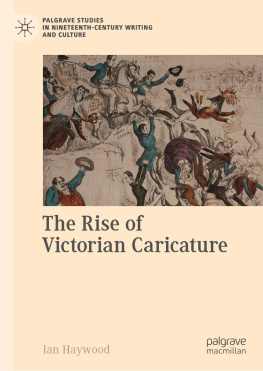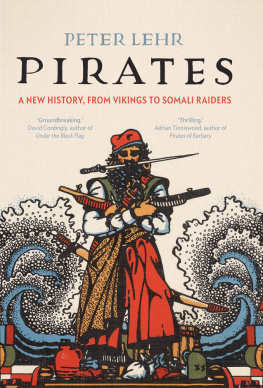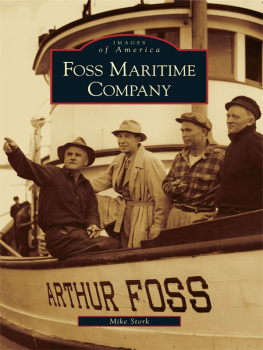Maritime Piracy
Maritime piracy is now a pressing global issue, and this work seeks to provide a concise and informative introduction to the area. Never truly having receded into a romanticized past, seaborne banditrys rapid growth was stimulated by low risks and increasingly high rewards. Currently, obsolete, incomplete and complicating structures and norms of governance, together with advances in technology, enable a lucrative business model for pirates, as they effectively operate with impunity and claim increasing ransoms.
Beginning with an overview and historical development of piracy and the relevant maritime governance structures, this work progresses to examine how twentieth-century shifts in global governance norms and structures eventually left the high seas open for predatory attacks on one of the worlds fastest growing and essential industries. Moving through contemporary debates about how to best combat piracy, the work concludes that the solution to a chronic global problem requires a long-term, holistic, and inclusive approach.
Examining militaristic, legal, and humanitarian strategies and offering a critical evaluation of the various problems they bring, this work will be of great interest to all students and scholars of international law, international organizations, and maritime security.
Robert Haywood is Senior Fellow at One Earth Future Foundation
Roberta Spivak is a Researcher at One Earth Future Foundation
Routledge Global Institutions Series
Edited by Thomas G. Weiss
The CUNY Graduate Center, New York, USA
and Rorden Wilkinson
University of Manchester, UK
About the series
The Global Institutions Series is designed to provide readers with comprehensive, accessible, and informative guides to the history, structure, and activities of key international organizations as well as books that deal with topics of key importance in contemporary global governance. Every volume stands on its own as a thorough and insightful treatment of a particular topic, but the series as a whole contributes to a coherent and complementary portrait of the phenomenon of global institutions at the dawn of the millennium.
Books are written by recognized experts, conform to a similar structure, and cover a range of themes and debates common to the series. These areas of shared concern include the general purpose and rationale for organizations, developments over time, membership, structure, decision-making procedures, and key functions. Moreover, current debates are placed in historical perspective alongside informed analysis and critique. Each book also contains an annotated bibliography and guide to electronic information as well as any annexes appropriate to the subject matter at hand.
63 Maritime Piracy (2012)
by Robert Haywood (One Earth Future) and Roberta Spivak (One
Earth Future)
62 United Nations High Commissioner for Refugees (UNHCR)
(2nd edition, 2012)
by Gil Loescher (University of Oxford), Alexander Betts
(University of Oxford), and James Milner (University of
Toronto)
61 International Law, International Relations, and Global Governance
(2012)
by Charlotte Ku (University of Illinois)
60 Global Health Governance (2012)
by Sophie Harman (City University, London)
59 The Council of Europe (2012)
by Martyn Bond (University of London)
58 The Security Governance of Regional Organizations (2011)
edited by Emil J. Kirchner (University of Essex) and Roberto
Domnguez (Su ff olk University)
57 The United Nations Development Programme and System (2011)
by Stephen Browne (FUNDS Project)
56 The South Asian Association for Regional Cooperation (2011)
An emerging collaboration architecture
by Lawrence Sez (University of London)
55 The UN Human Rights Council (2011)
by Bertrand G. Ramcharan (Geneva Graduate Institute of
International and Development Studies)
54 The Responsibility to Protect (2011)
Cultural perspectives in the Global South
edited by Rama Mani (University of Oxford) and Thomas G. Weiss
(The CUNY Graduate Center)
53 The International Trade Centre (2011)
Promoting exports for development
by Stephen Browne (FUNDS Project) and Sam Laird (University
of Nottingham)
52 The Idea of World Government (2011)
From ancient times to the twenty-first century
by James A. Yunker (Western Illinois University)
51 Humanitarianism Contested (2011)
Where angels fear to tread
by Michael Barnett (George Washington University) and Thomas
G. Weiss (The CUNY Graduate Center)
50 The Organization of American States (2011)
Global governance away from the media
by Monica Herz (Institute of International Relations, Catholic
University, Rio de Janeiro)
49 Non-Governmental Organizations in World Politics (2011)
The construction of global governance
by Peter Willetts (City University, London)
48 The Forum on China-Africa Cooperation (FOCAC) (2011)
by Ian Taylor (University of St. Andrews)
47 Global Think Tanks (2011)
Policy networks and governance
by James G. McGann (University of Pennsylvania) with
Richard Sabatini
46 United Nations Educational, Scienti fi c and Cultural Organization
(UNESCO) (2011)
Creating norms for a complex world
by J.P. Singh (Georgetown University)
45 The International Labour Organization (2011)
Coming in from the cold
by Steve Hughes (Newcastle University) and Nigel Haworth
(University of Auckland)
44 Global Poverty (2010)
How global governance is failing the poor
by David Hulme (University of Manchester)
43 Global Governance, Poverty, and Inequality (2010)
edited by Jennifer Clapp (University of Waterloo) and Rorden
Wilkinson (University of Manchester)
42 Multilateral Counter-Terrorism (2010)
The global politics of cooperation and contestation
by Peter Romaniuk (John Jay College of Criminal Justice, CUNY)
41 Governing Climate Change (2010)
by Peter Newell (University of East Anglia) and Harriet A.
Bulkeley (Durham University)
40 The UN Secretary-General and Secretariat (2nd edition, 2010)
by Leon Gordenker (Princeton University)
39 Preventive Human Rights Strategies (2010)
by Bertrand G. Ramcharan (Geneva Graduate Institute of
International and Development Studies)
38 African Economic Institutions (2010)
by Kwame Akonor (Seton Hall University)
37 Global Institutions and the HIV/AIDS Epidemic (2010)
Responding to an international crisis
by Franklyn Lisk (University of Warwick)
36 Regional Security (2010)
The capacity of international organizations
by Rodrigo Tavares (United Nations University)
35 The Organisation for Economic Co-operation and Development (2009)
by Richard Woodward (University of Hull)
34 Transnational Organized Crime (2009)
by Frank Madsen (University of Cambridge)
33 The United Nations and Human Rights (2nd edition, 2009)
A guide for a new era
by Julie A. Mertus (American University)
32 The International Organization for Standardization (2009)
Global governance through voluntary consensus
by Craig N. Murphy (Wellesley College) and JoAnne Yates

